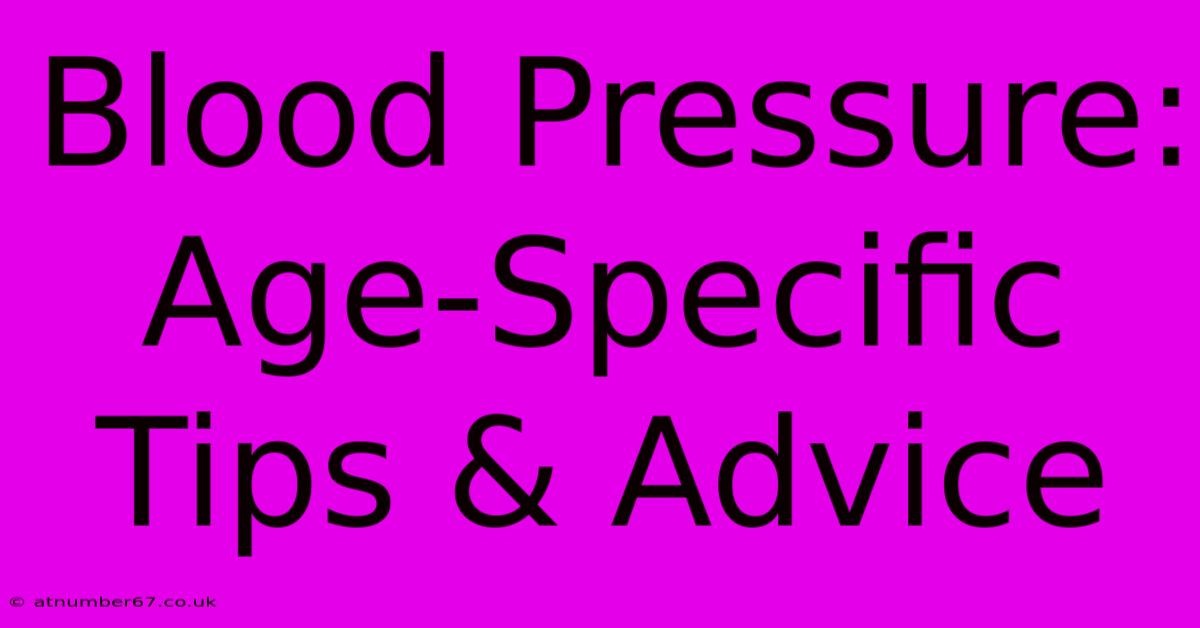Blood Pressure: Age-Specific Tips & Advice

Table of Contents
Blood Pressure: Age-Specific Tips & Advice
Maintaining healthy blood pressure is crucial throughout life, but the approach needs to adapt as we age. What works for a 30-year-old might not be as effective for a 60-year-old. This comprehensive guide provides age-specific tips and advice to help you keep your blood pressure in check, no matter your stage of life.
Understanding Blood Pressure & Age
Blood pressure, the force of blood against your artery walls, is measured in two numbers: systolic (the top number) and diastolic (the bottom number). High blood pressure (hypertension) increases your risk of heart disease, stroke, and kidney failure. As we age, our blood vessels can become stiffer, making it harder for the heart to pump blood, potentially leading to higher blood pressure. Therefore, understanding your age-specific risk factors and implementing appropriate lifestyle changes are key.
Blood Pressure Management: Age-Specific Strategies
Young Adults (20s-30s): Building Healthy Habits
This is the time to establish lifelong healthy habits that will pay off in the long run.
- Focus on Diet: Consume a diet rich in fruits, vegetables, whole grains, and lean protein. Limit processed foods, saturated and trans fats, and excessive sodium. Sodium intake is particularly important here, as it's a major contributor to high blood pressure.
- Regular Exercise: Aim for at least 150 minutes of moderate-intensity aerobic exercise or 75 minutes of vigorous-intensity aerobic exercise per week, along with muscle-strengthening activities twice a week.
- Maintain a Healthy Weight: Obesity is a major risk factor for high blood pressure. Strive for a healthy BMI (Body Mass Index).
- Limit Alcohol: If you drink alcohol, do so in moderation.
- Manage Stress: Chronic stress can elevate blood pressure. Practice stress-reducing techniques like yoga, meditation, or deep breathing exercises.
- Monitor Regularly: Get your blood pressure checked at your annual physical. Early detection is key.
Middle-Aged Adults (40s-50s): Addressing Potential Risks
During middle age, several factors can contribute to rising blood pressure, including weight gain, decreased physical activity, and stress from work and family responsibilities.
- Regular Check-ups: Schedule more frequent blood pressure checks with your doctor, perhaps every six months.
- Dietary Adjustments: Pay close attention to your sodium intake and consider reducing it further. Increase your intake of potassium-rich foods like bananas and spinach.
- Prioritize Exercise: Maintain a consistent exercise routine, even if it's just a 30-minute walk most days.
- Address Underlying Conditions: Manage conditions like diabetes and high cholesterol, as they significantly impact blood pressure.
- Consider Medication: Your doctor may recommend medication if lifestyle changes alone aren't enough to control your blood pressure.
Older Adults (60s and Beyond): Maintaining Control
As we age, blood pressure tends to rise. Older adults may experience age-related changes that require special attention.
- Medication Management: Work closely with your doctor to manage your blood pressure medication effectively.
- Fall Prevention: High blood pressure can increase the risk of falls. Maintain good balance and strength through regular exercise and address any potential hazards in your home.
- Regular Monitoring: Blood pressure needs more frequent monitoring in this age group. Discuss with your doctor how often to check your blood pressure.
- Medication Side Effects: Be aware of potential side effects of blood pressure medications and discuss any concerns with your doctor.
- Social Engagement: Maintaining social connections and engaging in mentally stimulating activities can contribute to overall health and well-being, indirectly impacting blood pressure management.
Beyond Age: Lifestyle Factors for All
Regardless of age, certain lifestyle factors universally impact blood pressure:
- Quit Smoking: Smoking significantly damages blood vessels, increasing blood pressure.
- Hydration: Drink plenty of water throughout the day.
- Sleep: Aim for 7-8 hours of quality sleep per night.
- Regular Check-ups: Regular visits to your doctor are essential for monitoring blood pressure and overall health.
Conclusion:
Managing blood pressure effectively requires a proactive and age-adapted approach. By understanding your risk factors and implementing the appropriate lifestyle changes and medical interventions, you can significantly reduce your risk of heart disease, stroke, and other serious health problems. Remember to consult your doctor regularly for personalized advice and monitoring. Taking charge of your blood pressure is an investment in a healthier and longer life.

Thank you for visiting our website wich cover about Blood Pressure: Age-Specific Tips & Advice. We hope the information provided has been useful to you. Feel free to contact us if you have any questions or need further assistance. See you next time and dont miss to bookmark.
Featured Posts
-
Paul Mersons Sons Winning Goal A Thrilling Finish
Apr 12, 2025
-
De Beers Net Worth How It Compares To Competitors
Apr 12, 2025
-
Lana Del Reys Net Worth A Detailed Look
Apr 12, 2025
-
The Impact Of World Events On Historical Research Global Perspectives
Apr 12, 2025
-
Fetty Wap How Much Money Does He Really Have
Apr 12, 2025
